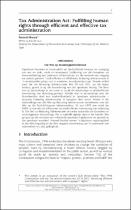| dc.contributor.author | Moosa, Fareed | |
| dc.date.accessioned | 2023-02-10T09:05:58Z | |
| dc.date.available | 2023-02-10T09:05:58Z | |
| dc.date.issued | 2018 | |
| dc.identifier.citation | Moosa, F. (2018). Tax Administration Act: Fulfilling human rights through efficient and effective tax administration. De Jure Law Journal, 51(1), 1-16 .http://dx.doi.org/10.17159/2225-7160/2018/v51n1a1 | en_US |
| dc.identifier.issn | 2225-7160 | |
| dc.identifier.uri | http://dx.doi.org/10.17159/2225-7160/2018/v51n1a1 | |
| dc.identifier.uri | http://hdl.handle.net/10566/8407 | |
| dc.description.abstract | The Constitution, 1996 embodies the ideals bonding South Africans who
must cohere and transcend their divisions to change the condition of
peoples’ lives by reconstructing a South African society dogged by
corruption and maladministration in the public sector, as well as various
social ills (such as, poverty and inequality). Section 7(2) of the
Constitution obliges the State to “respect, protect, promote and fulfil” the rights entrenched in the Bill of Rights. To do so necessitates that the
government has sustained access to adequate finance. Financial
constraints in the public treasury will hinder the State’s ability to achieve
social justice through the fulfilment of, inter alia, socio-economic rights.
Unless the problem of strained governmental resources is overcome, the
aspiration of a fully transformed society with human dignity, freedom
and equality for all will have a hollow ring. | en_US |
| dc.language.iso | en | en_US |
| dc.publisher | Pretoria University Law Press | en_US |
| dc.subject | Labour law | en_US |
| dc.subject | Tax Administration Act | en_US |
| dc.subject | Human rights | en_US |
| dc.subject | South Africa | en_US |
| dc.subject | Corruption | en_US |
| dc.title | Tax Administration Act: Fulfilling human rights through efficient and effective tax administration | en_US |
| dc.type | Article | en_US |

